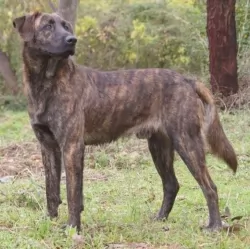 MyDogBreeds
MyDogBreeds Treeing Tennessee Brindle is originated from United States but English Foxhound is originated from United Kingdom. Both Treeing Tennessee Brindle and English Foxhound are having almost same height. Treeing Tennessee Brindle may weigh 9 kg / 19 pounds lesser than English Foxhound. Both Treeing Tennessee Brindle and English Foxhound has almost same life span. Both Treeing Tennessee Brindle and English Foxhound has almost same litter size. Both Treeing Tennessee Brindle and English Foxhound requires Low maintenance.
Treeing Tennessee Brindle is originated from United States but English Foxhound is originated from United Kingdom. Both Treeing Tennessee Brindle and English Foxhound are having almost same height. Treeing Tennessee Brindle may weigh 9 kg / 19 pounds lesser than English Foxhound. Both Treeing Tennessee Brindle and English Foxhound has almost same life span. Both Treeing Tennessee Brindle and English Foxhound has almost same litter size. Both Treeing Tennessee Brindle and English Foxhound requires Low maintenance.
 There doesn’t seem to be 100% clarity on how the dog came about but it originated in USA. It appears as though it was only since 1995 that records have been maintained through the American Kennel Club's Foundation Stock Service Program.
There doesn’t seem to be 100% clarity on how the dog came about but it originated in USA. It appears as though it was only since 1995 that records have been maintained through the American Kennel Club's Foundation Stock Service Program.
A Reverend Earl Phillips, who was a writer for a hunting magazine became aware of a Brindle Cur with a brown coat and tiger stripes. In fact ‘treeing’ is a type of hunting, where the dog chases an animal into a tree to escape. He heard about the dog’s amazing hunting skills.
In the early 1960s, he later formed The Treeing Tennessee Brindle Breeders Association, designed to protect the breed. It was in 2013 that the dog got foundation stock status with the American Kennel Club, but isn’t registered with the American Kennel Club.
 The English Foxhound was found in Great Britain as far back as the late 1700’s. They were bred to be scent hounds and hunt the fox by following his smell. It was a crossing of several different types of hounds that produced the English Foxhound. This included the Greyhound, the Bulldog and the Fox Terrier. It was perceived that there were not a lot of deer left in the United Kingdom to be hunted for both sport and food. So, a new dog would be needed instead for the Staghound and Deerhound.
The English Foxhound was found in Great Britain as far back as the late 1700’s. They were bred to be scent hounds and hunt the fox by following his smell. It was a crossing of several different types of hounds that produced the English Foxhound. This included the Greyhound, the Bulldog and the Fox Terrier. It was perceived that there were not a lot of deer left in the United Kingdom to be hunted for both sport and food. So, a new dog would be needed instead for the Staghound and Deerhound.
The Foxhound was developed as a pack animal bred to chase the fox followed by hunters on horses. The Foxhound was bred with incredible stamina, a great ability to follow scents, track prey, and act as a watchdog as well. This breed are pack animals. They hunt in packs and prefer to live in packs. A solitary English Foxhound is probably not a happy Foxhound. The English Foxhound is stockier and slower than his cousin the American Foxhound. The English Foxhound is recognized by the AKC and UKC. In 2012 the International Foxhound Association was developed to promote the English Foxhound.
 The Treeing Tennessee Brindle is a medium sized, deep chested breed of Cur, descending from the Old Brindle Cur dog.
The Treeing Tennessee Brindle is a medium sized, deep chested breed of Cur, descending from the Old Brindle Cur dog.
These strong dogs have a short, smooth brindle coat that is fairly soft to the touch. The coat's color is a mix of tan, black and a little bit of white.
He stands at between 41 and 61cm in height and weighs between 14 and 23kg both male and female. The Treeing Tennessee Brindle has a loud bark and it is best that this dog lives on a farm or in the suburbs as opposed to living in a small space in the city.
The Treeing Tennessee Brindle is a friendly, social dog and this is why he doesn’t make a particularly good watchdog.
He gets on well with children in the home as well as other dogs, not showing any aggression towards them.
They’re intelligent dogs and it will be a good idea to have them trained and socialized to make them well balanced and well behaved.
 The English Foxhound is a superb athlete who can run for hours without a break. He has muscular, sturdy and straight legs with round paws. His chest is deep, and his back is level. Their head is wide, and the muzzle is long with 16 inches in the front of the ears. The nose is long, and those ears are set low. They can be many colors as long as it is a “hound” color of tan, tricolor, black and white, or red.
The English Foxhound is a superb athlete who can run for hours without a break. He has muscular, sturdy and straight legs with round paws. His chest is deep, and his back is level. Their head is wide, and the muzzle is long with 16 inches in the front of the ears. The nose is long, and those ears are set low. They can be many colors as long as it is a “hound” color of tan, tricolor, black and white, or red.
 This brindle-colored cur dog is brave, intelligent and lively and his temperament allows him to be a good companion for his human family.
This brindle-colored cur dog is brave, intelligent and lively and his temperament allows him to be a good companion for his human family.
Even though they are friendly around strangers, they still make good watchdogs and will alert you to all kinds of visitors to your property. They do best in a home with large grounds and an active family where they can explore and sniff around. At the end of the day, they love to lie contentedly at your feet, a loyal, loving companion.
 The English Foxhound gets along with other dogs and like people. He was bred to be a pack animal, not a loner. He will get along with most any other animal and children as well. However, they are not often kept as pets because their prey drive and pursuit drive are so strong that nothing else matters. The chase is what life is all about for this breed. They are hardwired for it. They are not easy to train because they are constantly distracted by smells and movements that could send them off on the chase.
The English Foxhound gets along with other dogs and like people. He was bred to be a pack animal, not a loner. He will get along with most any other animal and children as well. However, they are not often kept as pets because their prey drive and pursuit drive are so strong that nothing else matters. The chase is what life is all about for this breed. They are hardwired for it. They are not easy to train because they are constantly distracted by smells and movements that could send them off on the chase.
Keep them on a lease when walking them so they don’t go wandering or running of. They love to run, and they love to talk – bay actually. They might slow down somewhere around 8-10 years old. They need a strong owner and a lot of exercise to be happy.
 The Treeing Tennessee Brindle is a robust, healthy breed. You’re not likely to battle with too many health issues with him.
The Treeing Tennessee Brindle is a robust, healthy breed. You’re not likely to battle with too many health issues with him.
Watch out for ear infections which are more common in floppy eared dogs. Other common dog diseases that you need to know about -
This is a viral disease which is highly contagious and with no known cure. It’s why there is a vaccine against it. Coughing, lethargy, high temperature and loss of appetite with vomiting are symptoms of this disease.
This is another highly contagious respiratory viral infection transmitted between dogs in close proximity to each other, like in kennels for instance.
Symptoms include coughing, sneezing, nasal discharge, breathing difficulties, lethargy and loss of appetite. It’s important to get veterinary assistance as pneumonia could set in.
 Overall a healthy and hearty breed, they are prone to hip dysplasia and renal disease.
Overall a healthy and hearty breed, they are prone to hip dysplasia and renal disease.
Degenerative and debilitating at worse. In mild forms cause lameness and arthritis.
Kidney disease – for some reason the kidneys cannot clear out toxins like urea and creatine
 A brush once or twice a week will be sufficient for this dog. Look inside his ears for signs of redness which could indicate an ear infection. Make sure his eyes are still bright and not red and with a pus discharge. Trim his nails too.
A brush once or twice a week will be sufficient for this dog. Look inside his ears for signs of redness which could indicate an ear infection. Make sure his eyes are still bright and not red and with a pus discharge. Trim his nails too.
The Treeing Tennessee Brindle is a high energy dog and he is going o want more than just a walk every day, although he will love that and rely on you for this daily outing.
He will also want ball games and hide and seek games.The breed needs an active owner who will take him on long walks and hikes.
Whenever you opt to give a dog commercially manufactured dog food, you need to check that the dog food is made with high-quality ingredients which are mostly made up of protein or meat.
Certainly a puppy will need protein in his food for proper growth and he will require 4 bowls of food a day. An adult dog will require 2 bowls of food a day.
The type of commercial dog food you buy will depend on the age of your dog as well as his activity levels. If your dog has a known allergy or illness, there are dog foods manufactured with that in mind.
Try and in include some homemade food into his diet. Nothing spicey and exotic as this can cause stomach problems. A good guide is boiled chicken, brown rice and vegetables.
 The English Foxhound is a high energy dog that needs a high quality dog food. He should be fed about 2.5 -3 cups a day in two meals of dry food. Because he is a deep chested dog, beware of bloat and don’t feed large meals, particularly before or after strenuous exercise.
The English Foxhound is a high energy dog that needs a high quality dog food. He should be fed about 2.5 -3 cups a day in two meals of dry food. Because he is a deep chested dog, beware of bloat and don’t feed large meals, particularly before or after strenuous exercise.
Seizures are caused by epilepsy, but they can be treated, and the dog can have a quality life.
When the stomach becomes distended or twisted. Can result in death if not treated immediately.
The English Foxhound’s long, floppy ears are prone to infection and allergies. Inspect and clean them regularly.
The English Foxhound is an easygoing canine, but he has an incredible energy level and needs a lot of exercise every day. In fact, if you are not going to hunt then don’t get a Foxhound. It is not fair to the dog. Of course, if you have acres of land and are into agility, tracking, coursing and rally then this might be the dog for you. But if the English Foxhound does not get enough daily exercise, he will not be a good house pet. This dog was bred to run for miles. You cant keep him cooped up in your house.